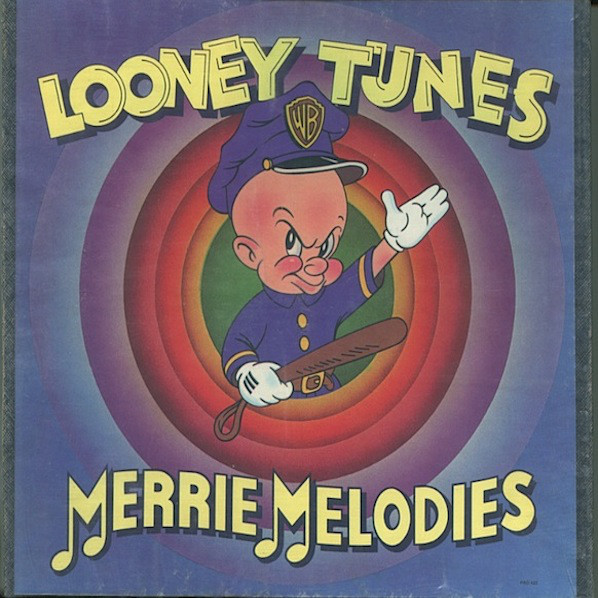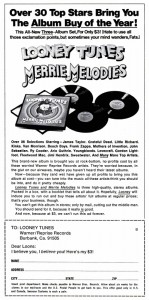Various forms of the records-that-changed-my-life meme have been making the rounds lately, so I came up with my own version, which I call “The Twenty-Five Record Albums That Changed My Life.” Throughout the coming month, I’ll write about one of these albums each weekday in the rough order in which I first heard them.

The passage I have in mind has to do with the now-forgotten Warner/Reprise “Loss Leader” albums, a series of low-priced sampler albums by Warner/Reprise artists that was one of the most ingenious and effective promotional ideas ever to be devised by a major record label. It certainly caught my eye, with far-reaching results:

To be a teenage boy…is to long above all things to appreciate the music of your own time. For me that was rock and roll, and notwithstanding the unhelpfulness of the local radio stations, there were plenty of other ways to learn about it, including Looney Tunes & Merrie Melodies, one of the “Loss Leader” samplers that Warner Bros. sold by mail for a dollar a disc.
I saw an ad for Looney Tunes & Merrie Melodies in Stereo Review in 1971, sent off three crumpled one-dollar bills ($17 today), and a few weeks later found myself in possession of a three-LP box set containing thirty-three songs by the very wide-ranging likes of Black Sabbath, Captain Beefheart, Ry Cooder, the Faces, Fleetwood Mac, Jimi Hendrix, Gordon Lightfoot, the Grateful Dead, the Kinks, Little Feat, Little Richard, Van Morrison, Randy Newman, Van Dyke Parks, James Taylor, Jimmy Webb, the Youngbloods, Frank Zappa and the Mothers of Invention, and a British group called, believe it or not, Hard Meat. (They were actually pretty good.)
Some I loved, some I loathed, a few I didn’t quite get, but none of it mattered: I soaked them all up with indiscriminate avidity….
Sad to say, Warner Bros. never released compact-disc versions of any of its Loss Leader sets. By then, though, I owned most of the albums from which my favorite cuts on Looney Tunes & Merrie Melodies were drawn, though it wasn’t until fairly recently that I caught up at last with Ry Cooder, whose “Alimony” sounds as piquant to me now as it did then. In the process of deciding which ones to buy, I was making the acquaintance of an extraordinarily diverse assortment of early-Seventies pop-music styles, many of which continue to speak to me a half-century later, which was just what the folks at Warner Bros. had in mind.
And did my youthful musical experimentation have any permanent consequences? Well, “Alimony” is one of seven tracks on Looney Tunes & Merrie Melodies to which I continue to listen today, the others being the Kinks’ “Apeman,” Randy Newman’s “Let’s Burn Down the Cornfield,” Hard Meat’s “Smile as You Go Under,” Jimi Hendrix’ “Stepping Stone,” Little Feat’s “Strawberry Flats,” and Fleetwood Mac’s “Tell Me All the Things You Do.” Seven out of thirty-three: as pop music goes, I’d say that’s a pretty good batting average.
(To be continued)
* * *
“Alimony,” from Ry Cooder’s self-titled debut album, released in 1970:
“Strawberry Flats,” from Little Feat’s self-titled debut album, released in 1971:
* * *
To read about album #1, go here.
To read about album #2, go here.
To read about album #3, go here.
To read about album #4, go here.
To read about album #5, go here.
To read about album #6, go here.
To read about album #7, go here.
To read about album #8, go here.
To read about album #9, go here.
To read about album #10, go here.
To read about album #11, go here.
To read about album #12, go here.
To read about album #13, go here.
To read about album #14, go here.
To read about album #15, go here.
To read about album #16, go here.
